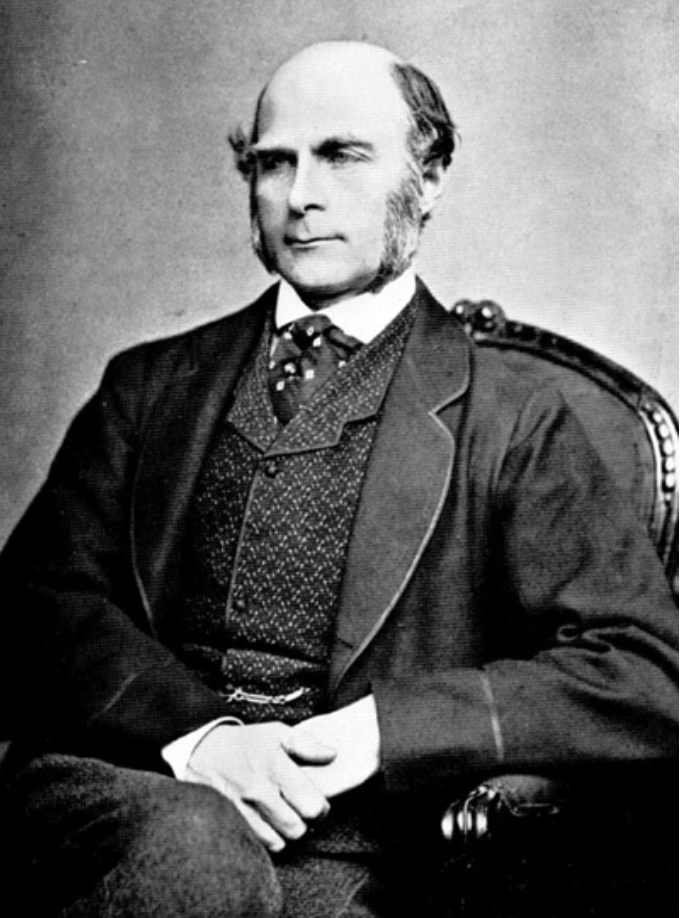
Before Darwin’s publication of On the Origin of Species by Means of Natural Selection in 1859, most human characteristics such as talent, personalities, and moral behaviors were thought to be acquired through environmental influences such as family, education, cultural training, and other factors described as “nurture.” However, Darwin had observed that many physiological characteristics in animals are passed from generation to generation through a process called “inheritance.”
Inspired by the concept of inheritance of characteristics in the human species, Darwin’s half-cousin, Sir Francis Galton, set out to investigate the relationships between the characteristics of parents and their offspring. In his 1869 publication Hereditary Genius, he presented data on eminent men and their sons, claiming that men of high eminence were more likely to have eminent sons than men who had not attained eminence, thereby demonstrating that eminence is a heritable quality. In a letter to Galton, Darwin wrote, “You have made a convert of an opponent in one sense, for I have always maintained that, excepting fools, men did not differ much in intellect, only in zeal and hard work.” However, Galton’s conclusions were challenged by others who argued that sons of eminent men had obvious social advantages in achieving eminence and that eminence itself was a subjective concept. These were the seeds of an acrimonious debate that would come into full flower a century later.
To gather data on more measurable human traits, Galton established in 1884, a walk-in “anthropometric laboratory” where he measured the height, weight, reaction time, and other human characteristics of willing Londoners. Using these data in an 1886 publication, Galton presented a graph showing the heights of 205 adults and 928 of their adult offspring. His extensive data and subsequent analysis revealed that the height of an individual is very much determined by the height of that person’s parents, i.e., height is mainly attributable to inheritance. In the process, Galton developed the concept of correlation and discovered the principle of regression to the mean.
Galton, as a highly talented descendant of a highly talented lineage wanted to determine whether this ethereal quantity known as “talent” is inherited. In his 1889 publication Natural Inheritance10, he presented extensive data he collected on 100 distinguished families showing the percentage of first, second, and third generation offspring that achieved eminence. His data indicated that 36% of the sons of eminent men became eminent, but only 9.5% of the grandsons of those eminent men reached eminence. He asserted, “Speaking roughly, the percentages are quartered at each successive remove, whether by descent or collaterally.”
Galton believed that intelligence, like height, was an inherited characteristic since, such characteristics were observed to run in families. This perception would eventually lead to the reification of intelligence through IQ tests that assigned numbers to intelligence and enabled the ordering of people on a linear scale. The validity of the reification assumption, i.e., that intelligence is a characteristic that is innate and can be measured, would be debated and challenged by scholars throughout the 20th century and explode into controversy with the publication of The Bell Curve in 1994.
In 1883, Galton published Inquiries into Human Faculty and its Development in which he introduced a plan for upgrading the intelligence of the human species. Coining the term eugenics, he suggested that marriages between the “brightest and the best” be encouraged, a proposal that was not well received. Many challenged the assumption that intelligence is predominantly inherited. However, the disagreement exploded into outrage two decades later when Galton proposed what is now called negative eugenics. Increasingly concerned that the burgeoning working class was out-procreating the talented elite, Galton feared a gradual “degradation” of the human species. To reverse this trend, he proposed restricting the breeding of intellectually inferior humans by sexual sterilization. Unintentionally, he opened a Pandora’s box of horrific possibilities that would come to fruition in the next century. (For more information on the concept of intelligence, visit: https://www.intelligence-and-iq.com/intelligence/

Quote “discovered the principle of regression to the mean”
Disagree, that linear regression is that which is a minor outlier point max and min is actually coupled to the whole system so that which is least connected is actually paradoxically the driver in the system. The middle mean bell curve is the redundant core.
Meme gene virus will jump generations, so it is not a straight time linear correlation.
Rome of the west: The eugenics are stronger in the herd of people in the Tiber, shit rises. Sterile minds of senators are anti nature. Intelligent is anti Petra, the rock is more intelligent that the thinker. Because it is the base of love and fertility.